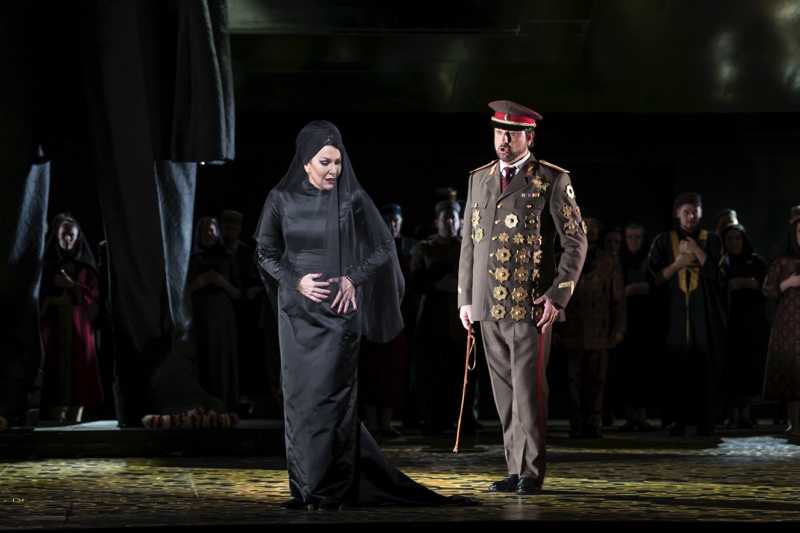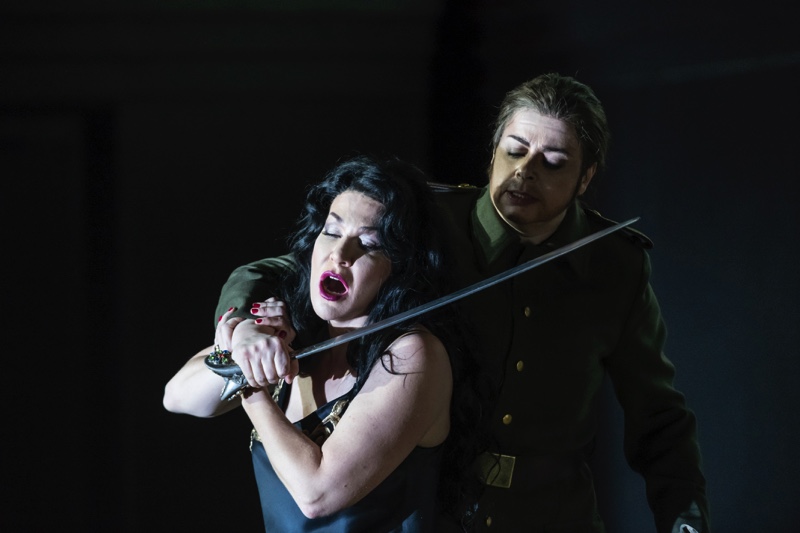Semiramide, Royal Opera, ROH, Covent Garden, November 2017
Posted on 20 November 2017For a Rossini work not staged by the Royal Opera in over 150 years this revival may seem a brave move, but Antonio Pappano in the orchestra pit and the superb cast of singers made it a musical treat. Even better than the excellent BBC Proms concert performance of 2016, which featured two of the same cast singing at Covent Garden: Daniela Barcellona and Mirco Palazzi (who gallantly took over from Michele Pertusi after Act I) as Arsace and Assur.

All images ROH/ Bill Cooper
The story concerns the widowed queen Semiramide, who intends to appoint Arsace as king and her own consort, though it was Assur who helped assassinate her husband King Nino. Shades of Hamlet, not to mention the appearance of the dead king’s ghost and the need for his son to avenge his death. A complication is that Arsace is that son, ignorant of his real parents and unrecognised by his mother who has called this brave warrior back to the capital. The beautiful Princess Azema, an object of desire for both Arsace and the Indian King Idreno, adds an emotional complication to a baroque story where supernatural forces come into play, and the high priest Oroe seems to know more than anyone else. In the end Arsace enters the dead king’s tomb to kill a sacrificial victim provided by the gods, intending to kill Assur, who in turn is hunting him in the darkness. As Oroe calls out to strike, Arsace mistakenly kills his own mother.

Conspirators Semiramide and Assur
Heavy stuff, lightened by Rossinian invention and melody, and if the music occasionally fails to fit the circumstances, this superb cast of bel canto singers carried it off beautifully. When Rossini first composed the opera he wrote the title role for his wife Isabella Colbran, whose voice had darkened, so although such luminaries as Joan Sutherland have performed the role with high coloratura ornamentation, it really belongs to a slightly lower register, and Joyce DiDonato’s interpretation was a dream. Daniela Barcellona made a strong Arsace, whose Act I duet with Semiramide was superb, and Lawrence Brownlee in the role of Idreno proved himself a passionate Rossinian tenor of huge charm.

Semiramide and Arsace
As the high priest Oroe, Hungarian bass Bálint Szabó delivered vocal depth with a Rasputin-like stage presence, and in Act II, Mirco Palazzi sang superbly as Assur after taking over from Michele Pertusi. Excellent contributions from Young Artists Konu Kim as a well-toned Captain of the Guard, and Jacquelyn Stucker as a prettily voiced Azema. Clothed in gold with long sleeves trailing along the floor, her costume emphasised the powerlessness of her role, but the production as a whole was disappointing.
David Alden has set the story in what looks like a modern Central Asian state undergoing a succession battle for the great leader whose image is embodied in a vast statue and large paintings of himself and family. A small boy playing with a toy horse represents Arsace in his early life, but the lighting is too strong throughout, and the use of the boy in the final mausoleum scene, taking Assur and then Semiramide by the hand, is a bit weird. Why not allow the final moments of action to be confused by dim lighting, as the composer intended?

Killing of Semiramide
This opera, based on a drama by Voltaire, was Rossini’s last before moving to Paris, and Alden is right to move it away from the bogus Persian-inspired fable about an Assyrian queen, probably based on at least two figures: Sammuramat (the origin of the name) in the late ninth century BC, and Naqia-Zaqutu, grandmother of Assurbanipal in the seventh century BC. Yet the magic that relieves the conventional rigidity of the score seems lost in the bright light of modernity, though the musical performance was outstanding.
Performances continue on various dates until December 16, with a BBC Radio 3 broadcast on 6 January 2018 — for details click here.

